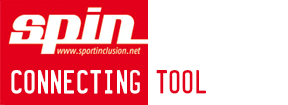About us
Migrants and ethnic minorities across the EU - in particular women and girls - face barriers when it comes to do practice sport and physical activities. Furthermore, the under-representation of migrants and their exclusion from positions of authority and the lack of advancement of minorities in non-playing positions is a recurring issue for European sport.
Against this backdrop, the fairplay initiative at VIDC brought together in 2010 a group of NGOs and sport organisations from 7 EU countries to address inclusion issues in sport. They designed the “Sport Inclusion Network (SPIN)” project which aimed to encourage the inclusion and involvement of migrants, ethnic minorities and asylum seekers through and in mainstream sport.
In 2011, the European Commission started to fund the first “SPIN” project. The underlying idea of SPIN was to raise awareness, increase networking and sharing of best practices among European & national sport stakeholders how to pro-actively involve migrants in and through sport. A second pillar was to empower and capacity-build migrant sport teams and initiatives including refugees and asylum seekers.
After the end of the project in 2012 all partners decided to continue to work together, despite the lack of funding. With the launch of the Erasmus+ sport programme we developed and implemented a series of innovative projects: The first ERAMUS+ collaborative partnership project was "European Sport Inclusion Network (ESPIN)” (2015-17) which was followed by “Sport Welcomes Refugees” (2018-2019) and "Sport Inclusion of Migrant and Minority Women” (SPIN Women) (2019-2020).
Lately, the SPIN partners have been successful with the European Commission funded project “Sport Inclusion of Refugees across Europe” (SPIN Refugees). The three-year project (2020-2022) aim of the SPIN Refugees project is to enhance the social inclusion and participation of asylum seekers and refugees on the local sport level through training, education and capacity-building of local sport stakeholders.
SPIN brings together experienced national key players in the field of sport & social inclusion with highly qualified staff: the fairplay initiative for diversity and anti-discrimination at VIDC, the Italian sport for all association UISP, a leading UEFA member association on interculturalism in football, the Football Association of Ireland (FAI), the Portuguese FIFPro member SJPF, the migrant-led Mahatma Gandhi Human Rights Organization (HU), the Finnish multicultural sport for all initiative Liikkukaa and Camino (DE), an expert on action-oriented research on sport and youth.
The intense SPIN partnership over the last years has allowed for the development of a series of innovative methods, products and events. SPIN publications all informed by qualitative empirical research include:
Core functions of the SPIN partnership include:
Against this backdrop, the fairplay initiative at VIDC brought together in 2010 a group of NGOs and sport organisations from 7 EU countries to address inclusion issues in sport. They designed the “Sport Inclusion Network (SPIN)” project which aimed to encourage the inclusion and involvement of migrants, ethnic minorities and asylum seekers through and in mainstream sport.
In 2011, the European Commission started to fund the first “SPIN” project. The underlying idea of SPIN was to raise awareness, increase networking and sharing of best practices among European & national sport stakeholders how to pro-actively involve migrants in and through sport. A second pillar was to empower and capacity-build migrant sport teams and initiatives including refugees and asylum seekers.
After the end of the project in 2012 all partners decided to continue to work together, despite the lack of funding. With the launch of the Erasmus+ sport programme we developed and implemented a series of innovative projects: The first ERAMUS+ collaborative partnership project was "European Sport Inclusion Network (ESPIN)” (2015-17) which was followed by “Sport Welcomes Refugees” (2018-2019) and "Sport Inclusion of Migrant and Minority Women” (SPIN Women) (2019-2020).
Lately, the SPIN partners have been successful with the European Commission funded project “Sport Inclusion of Refugees across Europe” (SPIN Refugees). The three-year project (2020-2022) aim of the SPIN Refugees project is to enhance the social inclusion and participation of asylum seekers and refugees on the local sport level through training, education and capacity-building of local sport stakeholders.
SPIN brings together experienced national key players in the field of sport & social inclusion with highly qualified staff: the fairplay initiative for diversity and anti-discrimination at VIDC, the Italian sport for all association UISP, a leading UEFA member association on interculturalism in football, the Football Association of Ireland (FAI), the Portuguese FIFPro member SJPF, the migrant-led Mahatma Gandhi Human Rights Organization (HU), the Finnish multicultural sport for all initiative Liikkukaa and Camino (DE), an expert on action-oriented research on sport and youth.
The intense SPIN partnership over the last years has allowed for the development of a series of innovative methods, products and events. SPIN publications all informed by qualitative empirical research include:
- Inclusion of Migrants in and through Sports. A Guide to Good Practice (2012)
- Handbook on Volunteering of Migrants in Sport Clubs and Organisations (2016)
- Equal access for migrant volunteers to sports clubs in Europe - A baseline study (2016)
- Sports for Refugees: Challenges for Instructors and Their Support Needs (2017)
- Sport Welcomes Refugees. A Guide to Good Practice in Europe (2018)
- Equal access and participation of migrant women and girls in sports – A study report (2020)
Core functions of the SPIN partnership include:
- Developing and delivering high quality training and educational tools for sport stakeholders
- Reflection, analysis and research: creating an evidence-base for social inclusion through sport interventions and practice
- Facilitating action at a grassroots level (empower and lending practical support to small groups and promote migrant and minority self-organisations as key agents for social change)
- Advocacy and lobbying for policy change at a European and national level
- Raising public awareness through public interventions and campaigning (influencing public discourse, develop counter narratives)
